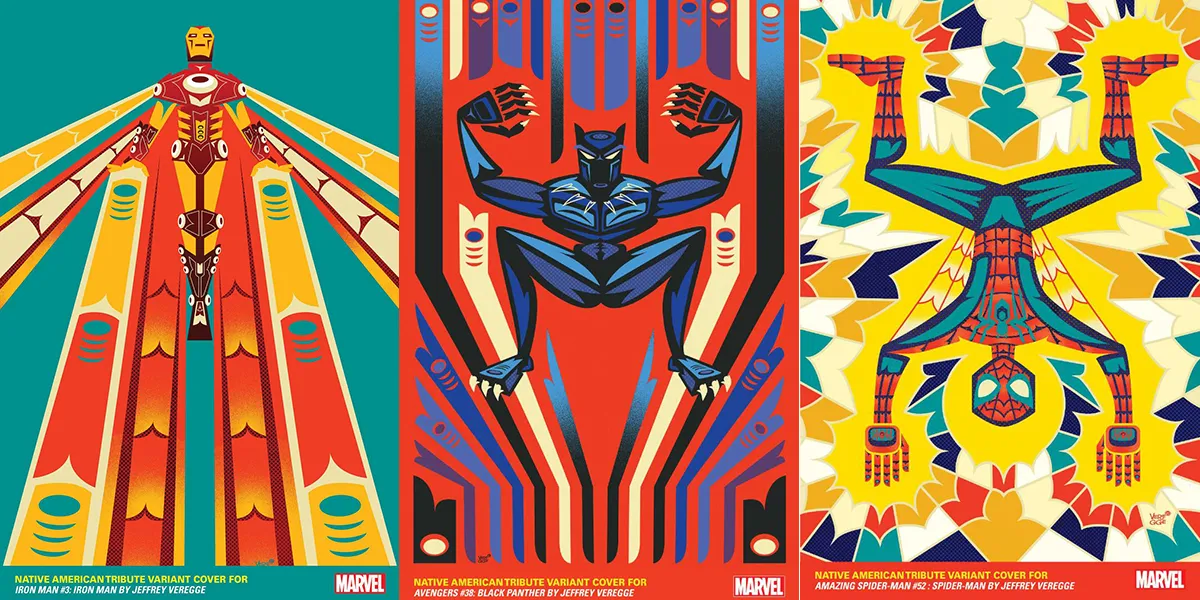For years, many cities, organizations, and activists have moved to reclaim “Columbus Day,” which represents violent colonialism, and turn the holiday into a celebration of Indigenous people. The day is now “Indigenous Peoples’ Day,” intended to honor Indigenous people and cultures, and that’s what we’re doing today. Here we highlight five Indigenous creators and advocates who are undertaking incredible work.
Jeffrey Veregge
The featured superhero art above is by Jeffrey Veregge, “an award-winning Native American Artist and writer from the Port Gamble S’Klallam Tribe near Kingston, Washington.” Jeffrey’s art blends his distinctive line form design and aesthetics with modern comic book and genre elements. Not only had Jeffrey created the stunning Marvel variant covers above and created other awesome comics-inspired design, but he’s recently created covered for IDW’s Star Trek Voyager series.
Thank you Gene and all who have given and created to make the worlds of @StarTrek You made me a better person and have given my imagination the greatest playground since 1987. LLAP Star Trek!
#StarTrekDay #StarTrek #Grateful pic.twitter.com/3mIq3W0iUS— Jeffrey Veregge (@JeffreyVeregge) September 8, 2020
My favorite is the top left which is a riff on the Pacific Northwest legend of Raven stealing the sun.
Amanda Blackhorse
Amanda is Dine’ and a member of the Navajo Nation. She is a social worker and has been a tireless advocate in the fight to get sports teams around the country to remove mascots based on Indigenous people that perpetuate stereotypes. Amanda was the leader of the lawsuit started in 2014 that eventually led to the Washington DC football team to lose their copyright on their offensive team name term. It wasn’t until this year that the team finally dropped the name, and Amanda’s fight continues.
Amanda Blackhorse and others founded the group, Arizona to Rally Against Native American Mascots to spread awareness about the harmful effects of offensive Native mascots locally and nationally. As an advocate against Native American mascots and as a social worker, she also speaks nationally about how colonization and historical trauma contribute to the legacy of Native American mascots.
You can find out more and sign the petitions at NoMoreNativeMascots.Org.
Elle-Maija Tailfeathers
Elle-Maija Tailfeathers is a writer, director, actor, and a producer and a member of the Kainai First Nation (Blood Tribe, Blackfoot Confederacy) as well as Sámi from Norway. Her work is intersectional and has been drawing attention and praise in film festivals, including the Toronto International Film Festival where her film The Body Remembers When the World Broke Open won high acclaim and was acquired by Ava DuVernay’s Array films. The movie premiered on Netflix, where you can still watch it.
Damn proud of our distribution work this year at @ARRAYNow.
THE BURIAL OF KOJO
Blitz BazawuleMERATA
Heperi MitaBURNING CANE
Phillip YoumansNext, THE BODY REMEMBERS WHEN THE WORLD BROKE OPEN directed by Elle-Maija Tailfeathers + Kathleen Hepburn. pic.twitter.com/jSEhtm97hF
— Ava DuVernay (@ava) November 12, 2019
Tailfeathers also appeared as an actress in another TIFF selection, by our next creator.
Jeff Barnaby
Jeff Barnaby is a Mi’kmaqi director as well as a writer and composer. His work seeks to bring attention to Indigenous stories and people through the vehicle of genre film. His most recent film is Blood Quantum, which is available to watch on Shudder. It’s a Zombie flick that directly tackles colonialism, as those with Native ancestry (aka Blood Quantum) are immune to the Zombie Virus.
And as you can tell from the trailer, it’s also scary as hell. This is one for Halloween month.
Abigail Echo-Hawk
Abigail Echo-Hawk is a Pawnee storyteller and spoken word artist, as well as a researcher and activist for the decolonization of data and health sciences for Indigenous people. Abigail is the director of the Urban Indian Health Institue. The institute seeks to help tribes with access to health data and better advocate for Native people not living on reservations when it comes to how they are viewed and represented in health data.
Data is so important, now more than ever. Native communities have been disproportionately ravaged by the Coronavirus pandemic, so getting these communities, doctors, and governments the right data is essential to saving lives. In their own words:
Decades of data that we believe to be incomplete have informed medical practices, programs, policies, and bills that continue to determine how American Indian and Alaska Native people are cared for by most institutions throughout the country.
We have made a commitment to decolonizing data to ensure that it is more accurate and accessible for partners, providers, policy makers, and health advocates and is informed by the people who know the health needs best—Native people.
Echo-Hawk is a leader in this movement and as an activist.
_
These are just a few of the many incredible creative, inspiring, and pioneering activists and artists that are working to bring attention to Indigenous culture and issues that affect Native people, so take this list as a jumping-off point. Please let us and our readers know about Indigenous and Native creators, activists, and causes in the comments below.
(Image: Marvel Entertainment/Jeffrey Veregge)
Want more stories like this? Become a subscriber and support the site!
—The Mary Sue has a strict comment policy that forbids, but is not limited to, personal insults toward anyone, hate speech, and trolling.—










Published: Oct 12, 2020 12:40 pm